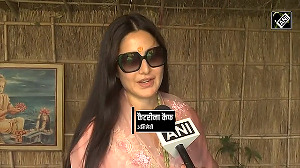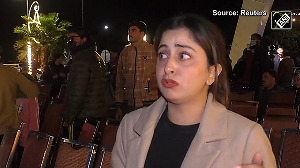The Nepal government and the Maoists on Tuesday signed a historic deal to end the 10-year armed insurgency and bring the rebels to mainstream politics.
After a marathon 16-hour meeting between top leaders of the Seven-Party Alliance and the rebels in Kathmandu, the two sides decided to constitute a 330-member interim parliament, form an interim government inclusive of the Maoists and hold elections for a 425-member constituent assembly by June 2007 to draft a new constitution.
Prime Minister and Nepali Congress President Girija Prasad Koirala, Maoist chief Prachanda, CPN-UML general-secretary Madhav Kumar Nepal and Nepali Congress (Democratic) president Sher Bahadur Deuba took part in the crucial meeting, among others.
The two sides also decided to lock up the Maoist arms and confine their combatants in cantonments by November 21.
The UN will monitor both the forces -- the Nepalese Army as well as the rebels, Nepal Sadbhavana Party general-secretary Rajendra Mahato said.
The present constitution will be scrapped and the interim constitution, already drafted by a committee, introduced from November 21, he said.
The reinstated Parliament would be dissolved and an interim parliament would be constituted by December 26. It will have 209 members from present House of Representatives and the upper house, 73 Maoists to be nominated by the rebels and 48 others nominated by eight parties from the civil society and other apolitical fields.
The fate of the monarchy, one of the most contentious issues, will be decided in the first meeting of the elected constituent assembly, Mahato said.
The government and the Maoists will sign a formal peace agreement on November 16.





 © 2025
© 2025